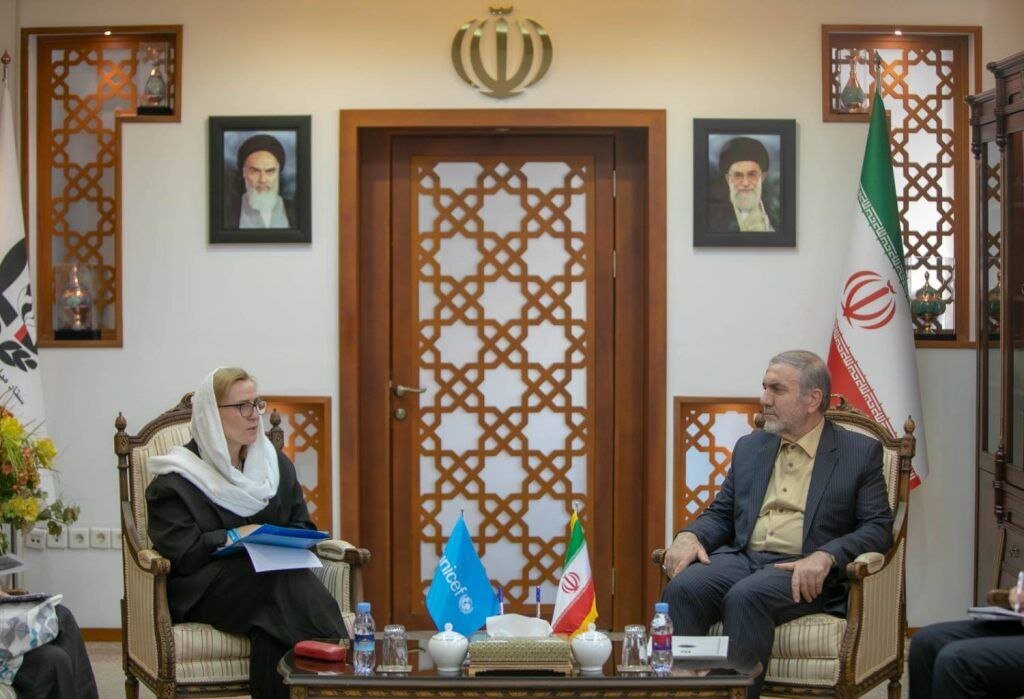DCHQ, UNICEF highlight developing partnership model

TEHRAN – Brigadier General Hossein Zolfaqari, the Secretary General of Iranian Drug Control Headquarters (DCHQ), and Monika Oledzka Nielson, the United Nation Children’s Fund (UNICEF) ad interim Representative in Iran, have underscored the need for the development of a cooperative model between the two organizations to be able to realize joint objectives and enhance the efficiency of collaborative measures.
During a meeting held on Monday, Zolfaqari said to be able to conduct joint efforts more effectively, the needed measures, and the responsibilities of different institutions, ministries, organizations, universities, families, and trainers should be clarified. Moreover, specific feasible provincial measures have to be taken, IRNA reported.
Highlighting the existing motivations, capacities, and public participation in carrying out major actions, Zolfaqari said the goal is to provide platforms to further benefit from existing capacities.
The official went on to laud UNICEF’s measures in Iran, saying that the taken measures which have focused on training individuals, positive parenting, preventing addiction in educational center of prisons organizations, improving mental health, empowering youths particularly girls, and holding training courses for non-governmental organizations and their managers have yielded positive results.
DCHQ and UNICEF will soon publish a book on guidelines and protocols for the treatment of addiction, and “We seek to further boost ties with UNICEF,” Zolfaqari further noted.
Nielson, for her part, commended DCHQ's efforts, saying that it would have been almost impossible to implement any of these actions without DCHQ’s support. Within recent years, UNICEF has adopted different measures to address youths’ health and well-being, as its target population.
Referring to the MASERAT or APSWEC (Adolescent Psychosocial Wellbeing and Empowerment Centre) program, which helps at-risk adolescents to protect themselves, build resilience, and practice self-care against social harms such as drug abuse and HIV, the official said the program has been conducted jointly by UNICEF and DCHQ. The positive outcomes have encouraged the two organizations to expand the implementation of the program nationwide as a long-term goal. Developed by DCHQ, the program focuses on prevention, treatment, harm reduction, and combating the entry and supply of drugs.
“One of the most important things that the DCHQ can do is to provide enhanced information and promote coordination for the implementation of programs to improve their effectiveness, because experience has shown that the stronger the coordination, the more successful the programs are. By improving communication strategies and the implementation of the tasks, this collaborative model can be introduced as a successful model in the region,” Nielson added.
Previous co-op
In November 2023, the Iranian anti-narcotics headquarters and the UNICEF office in Tehran signed a memorandum of understanding to launch a joint plan of action for the prevention and treatment of drug abuse among teenagers.
The joint plan of action was to be implemented over 2023-2024. It would be the main base of cooperation with UNICEF in combating narcotics.
The joint activities were to be defined and carried out in cooperation with relevant national institutions, Fars reported.
Previously, through implementing two joint plans of action, some activities have been carried out for the prevention and treatment of drug abuse among adolescents.
Setting up two health and rehabilitation centers for at-risk adolescents in two provinces of the country, which are known as exemplary centers providing services to the target community, was one of the measures taken in this regard.
In October 2023, UNICEF and the Iranian anti-narcotics headquarters cooperated to develop an emergency protocol for staff working with at-risk adolescents to enhance their capacity for addressing youth needs during emergencies. They also held two workshops, the UNICEF website reported.
Thanks to these programs, social workers, experts, counselors, volunteers, and peers would be able to provide much more effective services in case of any emergencies to vulnerable youth, adolescents, and their families.
The aim of these workshops was to expand the technical needs of those working with vulnerable and at-risk girls to provide more efficient services to them in case of emergencies.
During the workshops, in addition to capacity building on crisis management and specialized interventions, a protocol for UNICEF-supported Adolescent Wellbeing Centers in Mashhad and Kermanshah was developed to strengthen their emergency response capacity.
MT/MG
